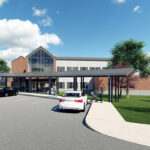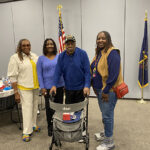Those of us who are privileged to have spent our careers working with children and families or toward enhancing communities know that it can be a beguiling idea that somewhere, there is one solution that will enable everyone to thrive.
Later this year, Catherine Hershey Schools for Early Learning, a subsidiary of Milton Hershey School, will be opening an Early Childhood Education Center in Harrisburg, serving children from six weeks to age 5. With a high-quality early learning program and a family success approach (or two-generational approach), CHS will partner with families to support the growth of both children and their families, with all costs covered for those who qualify.
As the Family Partnership Manager at CHS, and with almost 20 years in the social work field, I am passionate about coming alongside families to identify long-term goals for both the family and child and partnering together to work toward them, connecting families to resources and programs that promote overall family health and enable long-term success.
It is clear that when you are serving children and families, having the right structures in place can support families in gaining the confidence and skills to support their child, and, ultimately, the entire family can thrive. Child development and learning occur in multiple contexts, including family, culture, language, community and the early learning setting — and early learning environments are just one part of that complex puzzle.
Children are more likely to flourish in a welcoming, safe and enriching environment at school and home. This often includes taking an approach that recognizes the need to support the whole child. But what does that look like? It comes down, simply, to identifying needs and determining a plan of action.
Identifying Barriers
Of course, the complex web of barriers families face is anything but simple. However, identifying them is the first step to building a plan.
Lack of family resources can encompass a range of factors, from financial constraints to limited access to transportation, childcare, or social support.
Personal development also plays a role: families may need support in planning, organization, and time management skills. This could involve offering workshops, mentoring or guidance to help them effectively translate their goals into actionable steps.
And let’s not forget emotional support. Living in crisis or chronic stress prevents the family from building the resilience needed to thrive in challenging situations. Interventions that address immediate needs and provide strategies for coping with stress can lay the groundwork for a brighter future.
We want to balance that with helping families build a stable foundation of basic needs (Maslow’s hierarchy), which acknowledges that these are prerequisites for effective learning and growth. It can be easy to judge families from the outside and be critical that they are not focusing on cognitive skills and educational achievement (what we call the Bloom model.)
Building Structures
Ultimately, understanding and responding to the diverse challenges families may face enable us to connect families to the people or services they need.
Empowering families, whether through mentoring or coaching, will enable families to support their children and advocate for them throughout their educational journey and beyond.
One way we can understand our families is through conducting home visits. This approach recognizes the importance of the home environment and allows for more personalized guidance tailored to the family’s specific needs.
Consistency is an essential element for child learning and behavior. Building skills both in the classroom and at home is an effective way to help families cope better with stress.
Some families face additional challenges: single fathers, teen parents and those with English as a second language need specific support that recognizes diverse family structures and backgrounds.
But one thing remains the same. Developing a warm and welcoming approach to families in early childhood programs or other family-serving programs is foundational to relationship building. This approach sets the stage for children’s growth and the establishment of community connections and collaboration.
Yes, there are many barriers, but if there is one solution, it lies in community partnerships. Community partnerships mean that together, we can help build the scaffolds to support healthy families and healthy families grow, learn and change trajectories for everyone.
Lindsay Knepp is the Family Partnership Manager at Catherine Hershey Schools for Early Learning, President of the Pennsylvania School Social Work Personnel (PASSWP) Board, and the 2019 PASSWP School Social Worker/Home School Visitor of the Year.
If you like what we do, please support our work. Become a Friend of TheBurg!






